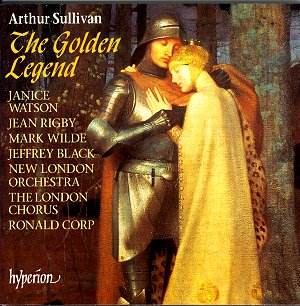Listening to the admirable Hyperion performance of "The
Golden Legend", I found myself wondering what on earth - or in heaven
- gives Sullivan his special power to warm the spirit? This 95-minute
cantata is in many ways the finest of his non-Gilbertian works, and
a thing of considerable beauty; yet its neglect throughout the last
hundred years has been as inevitable as its huge success after the Leeds
Festival triumph of 1886.
Revered in its time, Longfellow's verse tale of the self-sacrifice
of a pure virgin for the life and soul of a Prince she doesn't know
is severely alien to modern taste. Its Christian motif has a classic
antecedent in the story of Alkestis, but Longfellow's version crucially
bales out by allowing Elsie to be saved at the last gasp, and even marry
her redeemed Prince - a conclusion which transmutes "The Golden Legend"
into the comfortable, leaden fable which Joseph Bennett adapted and
Sullivan set.
Still, now we can put our anti-macassar complex behind
us, and there's no need to be remotely apologetic for the music. Mendelssohn
provides some of the moral uplift, but more surprising is the influence
of Berlioz's "Damnation of Faust". This is manifest in Sullivan's orchestral
wizardry, and most strikingly of all in his wittily academic characterisation
of Lucifer, light epigone of the Frenchman's Mephisto. "Eugene Onegin"
makes an unexpected appearance, too; but in turn, Sullivan's influence
in freeing the young Elgar from the teutonic yoke is patent. The dying
Gerontius is just around the bedpost from Sullivan's ailing Prince Henry,
even - as David Russell Hulme's first-rate note points out - down to
some shared musical material.
"The Golden Legend" cannot compete with either the Berlioz
or Elgar in consistency or depth of musical integration. Nonetheless,
those special touching qualities give it a gentle power all its own.
Sullivan's limpidity is perhaps closer to Schumann than anyone, but
nobody else could have penned the long-limbed, sensuous melody that
graces the final scene for hero and heroine; the luscious sweetness
of Henry's solo on succumbing to Lucifer's demon alcohol; or best of
all, the superb sunset glow of Elsie's 'The Night is calm', as she contemplates
the sea on what she believes will be her last evening.
The appearance of "The Golden Legend" on commercial CD
is a milestone long overdue, and this performance can be heartily welcomed
on nearly all counts. Though lacking the blazing fervour of David Lyle's
prize-winning live Edinburgh performance (with largely amateur forces,
privately available on Savoyard Chorus and Orchestra's 2-CD WP1100)
the newcomer has been scrupulously prepared by Ronald Corp, lovingly
executed by his choir and orchestra and given a nicely balanced recording
by the Hyperion team.
Corp's pacing allows the work to unfold naturally, without
any sense of hurry or striving for effect. Sullivan's delightful scoring
has space to register with great presence, given the warm but not over-reverberant
acoustic of All Saints Church, Tooting. The London Chorus is notable
its for crystal diction, and though it is not a large body this pays
dividends in the two unaccompanied motets, 'O gladsome light' and 'O
pure in heart'. Contrariwise, tenors and basses sound marginally underpowered
and underpitched in the sweeping final chorus 'God sent His messenger
the rain', though the central fugal section is certainly done with captivating
verve.
Unusually for a major choral work of its time, "The Golden
Legend" stands or falls by the quality of its soloists, and here the
Hyperion version scores highly. Mark Wilde is a lyric tenor in the Richard
Lewis mould, singing with the rich, clean vocal sheen you'd expect from
an ENO Tamino, and his Prince Henry is a pleasure throughout. Though
Janice Watson's creamy soprano is just beginning to curdle at the top,
her weight of voice and purity of line is just right for the virginal
Elsie. It's hardly her fault that the thrilling 1927 record of 'The
night is calm' by the great Wagnerian Florence Austral, with chorus
and orchestra under John Barbirolli, remains hors concours.
Jean Rigby is Elsie's mother Ursula, and though she doesn't
quite erase memories of Sarah Walker's matronly passion in the Leeds
centennial performance under Mackerras (for long circulated on illicit
cassettes, BBC Legends take note!) her reflective, youthful-sounding
characterisation avoids any taint of emotive excess. Only Jeffrey Black's
generalised, woolly Lucifer disappoints, missing most of Sullivan's
musical tricks and casting a blight on proceedings in quite the wrong
sense.
Altogether, then, a heart-warming issue which is a must
for anyone with a more than passing interest in the choral range of
which "The Golden Legend" forms a distinct peak. "The Mikado" it ain't,
but even dyed-in-the-wool Savoyards brought up on the article of faith
that Sullivan without Gilbert was Sullivan without the spark, may find
themselves surprised and delighted by what they hear in this fine value
Hyperion set.
Chris Webber
See also review by Raymond
Walker


